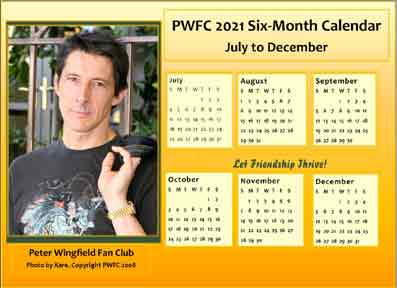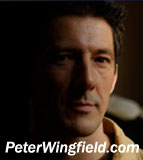Discussing Touching Evil with Peter Wingfield
At the PWFC Road Trip: Orlando convention in May 2004, the club Webmaster had the opportunity to interview Peter for the club magazine, LFT. In this portion of that interview (excerpted especially for the Web site), Peter speaks about the character he played in Touching Evil, a series that aired on the USA network.
PWFC:
Getting back to Touching Evil, in your interview for the magazine
a few months ago, you mentioned that you thought some of your work in Touching
Evil “would stand right up there with the Jimmy scene with MacLeod”.
[Note: the “Jimmy” scene is well-known among
fans of the TV show Highlander. It appeared in the episode “Comes
a Horsemen”.]
PW: Yes.
PWFC: Were you thinking of that final scene where you shoot the
alleged murderer and then lean your head against Creegan’s gun?
PW: Yes—that’s an intense scene. There
were really three, maybe four, big scenes in that final episode. They each
have a—the roof top scene—has a quality which I like,
which I’m very pleased with. The barbequing scene—there
are emotional journeys in those scenes, there are pinnacle moments. But
then the final scene—when I first saw it, which was at looping,
because I had to re-record some of the lines from that scene—I
was struck by the bleakness of it. I watched that performance and I really,
I absolutely believed that was a guy that wanted to die.
PWFC: That’s what I thought, that he’s committing suicide.
PW: Yeah. But it wasn’t a theatricality to it. There
was a bleakness, a hopelessness that was very, very deep that I was actually
quite shocked by how intense that was. I think it’s a great scene,
because it starts off—you think you’re in pretty regular
kind of TV land. You know the guy is going to do something ridiculous and
the hero cop comes in and persuades him not to do it, and the day is all
saved. And then suddenly, when you think it’s over, he just suddenly
shoots the guy on the ground. And you’re into quite different territory
where you don’t know what-what’s going to happen. There is some
genuine intensity to that scene.
PWFC: To me, watching your eyes—your eyes were saying,
“Shoot me, pull that trigger, put me out of my misery, I can’t
stand it.”
PW: Yep.
PWFC: The barbeque scene was also intense desperation, [when your
character asks Creegan] “did I do the right thing?”
PW: Yeah. He is not a bad man. The complexity of the story
is increased by the fact that Creegan would have done the same thing. Or
at least he thinks he would have. He never gets the chance to find out whether
he actually would have pulled the trigger, because when he gets there the
guy is already dead. So there is that dilemma within him, too. Is it the
right thing? That’s why Krakauer asking him that question has an intensity
and a resonance. It is. . .it is the question, the big question
of the show.
PWFC: And it was never answered.
PW: Yeah. Because it’s what drives that character,
it’s what drives the series Touching Evil. What is appropriate force?
There is a childlike quality to Creegan. There is the childish logic, the
uncomplicated logic of ‘if this guy does bad—we know he
did badly to these boys—it’s right to kill him.’ There
is great appeal to that line of thinking.
©2004 PWFC—Please do not copy or re-post without written permission.


